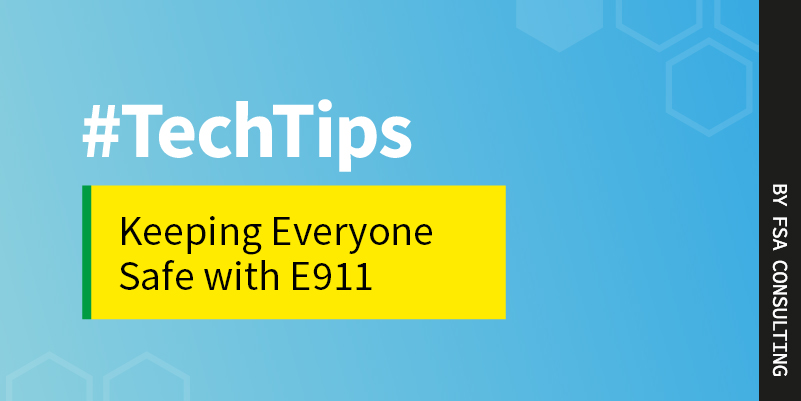User-friendly tools for emergency communications benefit everyone’s safety. This is true if you have a private office or a business that welcomes guests and customers. This Tech Tip shares details about Enhanced 911 (E911) requirements, Kari’s Law, and RAY BAUM’S Act compliance.
What is E911?
If we encounter an emergency or disaster situation we dial 9-1-1. With advancements in communications technology like wireless phones and VoIP systems, the Federal Communications Commission (FCC) is implementing enhanced 911 services. These integrate nationwide communication for emergency services with multi-line and wireless phone systems.
Why is E911 Service Important?
With E911, your phone number and your location are automatically reported to 911 dispatchers for fast and effective emergency help. Organizations and companies need to make sure their phone systems are updated and compliant with E911.
Let’s talk about the most recent E911 federal law compliance you should know—Kari’s Law and RAY BAUM’S Act.
What is Kari’s Law?
Kari’s Law is a federal law in response to the death of Kari Hunt, killed in a motel room in 2013. Ms. Hunt’s 9-year-old daughter called 911 for help four times from the motel’s room phone. However, the calls never went through because the motel’s phone system required first dialing “9” for outbound calls.
Kari’s Law requires multi-line telephone systems to have direct 911 dialing and notification capabilities. Multi-line telephone systems, are typically in office buildings, campuses, and hotels. In addition to eliminating any required prefix for outbound emergency calls, Kari’s Law also mandates a designated contact within the establishment is notified when someone calls 911 with a multi-line telephone system.
Kari’s Law is an essential federal mandate. It is one of the e911 requirements designed to keep your staff and customers safe. Next, we will talk about the equally important RAY BAUM’S Act.
What is RAY BAUM’S Act
RAY BAUM’S Act stands for Repack Airwaves Yielding Better Access for Users of Modern Services Act. Accordingly, this act requires a caller’s dispatchable location to be automatically provided to the public safety officer, regardless of the technology used when someone dials 911. The dispatchable location includes a street address and other helpful information like floor, suite, or apartment number, to help public safety officers locate the caller within a building and deliver emergency services.
Like Kari’s Law, RAY BAUM’S Act also applies to fixed multi-line telephone systems. Also, it is mandatory for interconnected VoIP, telephony, telephony relay services, and non-fixed applications such as softphones. The RAY BAUM’S Act compliance deadline for business and public venues with multi-line telephone systems was January 6, 2022!
Ensure Your Organization or Business Complies with RAY BAUM’S Act
When your establishment uses a fixed multi-line telephone system, every connected device must be updated with a dispatchable location. Phone extensions are a hurdle to consider during the multi-line telephone system update. The extension value never passes outside the phone system when a call with an extension and doesn’t have a unique direct inward dialing setup. This means when an emergency call drops from a non-compliant phone system, the public safety officers can’t call back.
For non-fixed VoIP phone systems, compliance to RAY BAUM’S Act requires dynamic location routing and additional provisioned network elements like WiFi access points or ports with a dispatchable location. When the caller attaches to one of the provisioned network elements, their softphone application will capture the updated dispatchable location information.
Your Next Step with E911 Compliance
Check with your current phone provider if you aren’t sure whether your business phone system is compliant with Kari’s Law and RAY BAUM’S Act.
Both Kari’s Law and RAY BAUM’S Act are forward-looking. They only apply to multi-line telephone systems or VoIP business phone systems manufactured, imported, sold, leased, or installed after February 16, 2020. Therefore, if you switch business phone systems, ask the business phone provider to set up the system for compliance.
You can also reach out to a professional managed IT and business phone system provider like FSA Consulting to do a thorough office technology assessment and improvement. We always recommend organizations and businesses comply with all federal law and state regulations to keep their staff and customers safe and secure.
Some additional resources:

